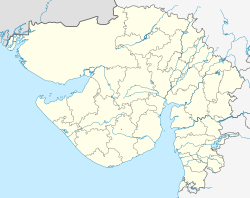Porbandar
|
Porbandar પોરબંદર Sudamapuri |
|
|---|---|
| City | |

Hari Mandir Temple
|
|
| Nickname(s): pbr | |
| Coordinates: 21°37′48″N 69°36′0″E / 21.63000°N 69.60000°ECoordinates: 21°37′48″N 69°36′0″E / 21.63000°N 69.60000°E | |
| Country | India |
| State | Gujarat |
| District | Porbandar |
| Elevation | 1 m (3 ft) |
| Population (2011) | |
| • Total | 217,307 |
| Languages | |
| • Official | Gujarati, Hindi and English |
| Time zone | IST (UTC+5:30) |
| PIN | 360575 |
| Vehicle registration | GJ-25 |
| Website | porbandar |
Porbandar ![]() pronunciation is a coastal city in the Indian state of Gujarat, perhaps best known for being the birthplace of Mahatma Gandhi and Sudama (friend of Lord Krishna). It is the administrative center of Porbandar District.
pronunciation is a coastal city in the Indian state of Gujarat, perhaps best known for being the birthplace of Mahatma Gandhi and Sudama (friend of Lord Krishna). It is the administrative center of Porbandar District.
Onshore explorations in and around Porbandar brought to light, for the first time, the remains of a late Harappan settlement dating back to the 16th - 14th century BCE, which is similar to that from Bet Dwarka. This is another evidence to suggest that the Harappan legacy of maritime activity continued till the late Harappan period on the Saurashtra coast. The discovery of ancient jetties along the Porbandar creek signifies the importance of Porbandar as an active centre of maritime activities in the past.
Past Harappan age and classical Vedic ages, Indian mythology says it is the birthplace of Sudaama (Friend of Lord Krishna in Dwaparyug), hence it is referred to as Sudaamapuri or Sudamapuri.
Porbandar was formerly the seat of the eponymous princely state in British India. The ruling family of the state belonged to the Jethwa clan of rajputs and had been established in the area since at least the mid-16th century. The state was subordinate to the Mughal governor of Gujarat until being overrun by the marathas in the latter half of the 18th century, whereafter they came under the authority of the Gaekwad court at Baroda, and eventually of the Peshwa. In common with the other states of Kathiawar, the state first came into the ambit of British influence in 1807, when the HEIC guaranteed security in the area in lieu of a fixed annual tribute to be paid to the Peshwa and the Gaekwad. In 1817, the Peshwa ceded his share to the HEIC; in 1820, the Gaekwad agreed to have the HIEC collect his due tributes in Kathiawar and remit the same to his treasury.
...
Wikipedia


